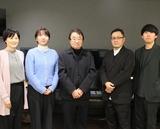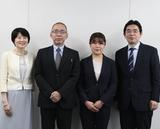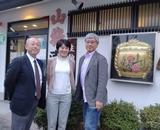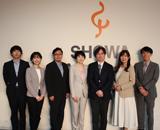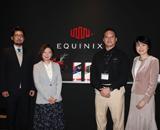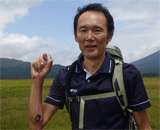September 2018
Hardships and Lessons Learned from a Startup that Paid Off Many Years Later
Ohsato: When you realized you wanted to start a business, how did you get started? What steps did you take?
Minagawa: You might know about the Fuji Rock Festival; it's the largest outdoor music festival in Japan, and it's held once a year. Masahiro Hidaka is the man who started this festival, and he always stayed at the inn that my parents built. As Fuji Rock grew larger every year in Naeba, he and I became closer friends. One day Mr. Hidaka suddenly gave me space for a store at the event, and that's how I got my first experience managing a business.
Ohsato: What an extraordinary way to get started.
Minagawa: Indeed. From that, my business began with me thinking that "somehow, I just have to do this," but "how do I do this?" However, I knew that I would have to travel overseas for ski competitions every year, so from the beginning I never planned on doing it all by myself. I started by working on how to structure it, on the assumption that I'd be leaving it in someone else's hands.
Even now, I still find my experience with the store at Fuji Rock to be extremely helpful. When I first started with the store, I would make the rounds calling on my friends to bring people in to work there. I would say things to entice them, like "you can hear live music for free." When I did that, people did come. But generally the people I brought in that way didn't have the intention of doing any work, so they would only do things they were told to do. It ended up in a situation where you'd ask someone why they hadn't tidied up, and they'd just say: "Nobody told me to do that."
Then I came up with some ideas, such as "this guy can't handle five different tasks at once, so I'll just put him in charge of three processes," and created lines suited for each of the employees. Then, starting the very next day, we sold more than twice as much merchandise. That was purely a "wow!" type of feeling, and from that point on I gradually became more interested in how to mobilize and manage people. It was really huge for me to have gained that knowledge from a startup.
Ohsato: Wow, so you got your start in business during your competitive skiing days?
Minagawa: Some athletes think that during their competitive career they should focus on competitions. For me, though, when I was resting my body I didn't want to rest my mind too, so I worked (Laughs). Having multiple things on my mind at once during that short time centered on competitions helped me become who I am today.
Environments Geared Toward Second Careers for Competitive Athletes
Ohsato: Mr. Yoneya from our company's Ski Team really wanted to hear what you have to say about your transition from skiing to business, so he has also joined us here today. Actually, he retired from competitive skiing only recently, and from now on I'd like him to move forward with his second career as a businessperson. He still doesn't have a clear idea of his future, but he does have a general vision of what he would like to do. I think the task at hand for him is to turn that into a clear goal, and learn what he lacks in order to reach it.
Minagawa: Yes, that makes sense. Young people can't just jump into something out of the blue, so I think what they need is a partner. Like Arc is to Mr. Yoneya. If they don't have a partner, I don't think they'll really know what the next steps will be--like what they want to become, or what they want to do in the company. I think in those cases it is very important to be "on the inside." Being on the inside of a company and seeing its inner workings shows you the true nature of business, and puts you in a position where you cannot pass those things off as something for others to deal with. And those of us who have spent the majority of our lives, energy, and time on winter sports, we are "snow masters." We have to utilize the knowledge and insight we have gained from that in our second careers.
Ohsato: Precisely. Especially being the smaller company that Arc is, when supporting top athletes I want to also conceptualize second careers for them and give them a view of the business world. I always tell the Ski Team members that I want them to "take what they've learned from skiing and put it to use in our company, and at the same time, take what they've learned outside of skiing and use it on the slopes." I think this can also benefit current competitive skiers in terms of their skiing performance. Mr. Yoneya is a good example of someone who has taken that to heart.
There was also another episode with Mr. Yoneya that I'd like to recount. When Arc originally announced that we would "support top athletes in minor sports," many different athletes reached out to us. In our responses to them, I tried to also include a little bit of advice. Most of them ended up never responding back, but Mr. Yoneya always found a way to put that advice to use, and continuously kept in contact afterward.
Yoneya: That's true, I did. I felt that answering Ms. Ohsato's questions would be an important key to my future. Just as Mr. Minagawa said, I'm also a "snow master," so I think the decisions have ways of making themselves in some cases. I also consider myself to be someone who has seen a world that most people can't normally see, so I would like to find ways to put that to use in society. I felt that with Arc, I could accomplish that, listening to what Ms. Ohsato has to say.
Minagawa: What I hope you can develop for yourself is "productivity." What I mean by that is "the ability to generate results and profit." As a businessperson now, you're at the level where you receive support from others and help from Ms. Ohsato as you do your work. You have to turn that around, and be the one who boosts the "productivity" of others. That means putting in the effort to be someone who generates profit for Ms. Ohsato and for Arc.
Yoneya: That makes sense, thank you. I have just been put in charge of translation services and marketing, so I'm going to work hard and try to double our sales!
Ohsato: Mr. Minagawa, thank you for your words of encouragement for Mr. Yoneya and for Arc. And thank you also for taking the time to join us for this interview today.
Feature Interview Index

